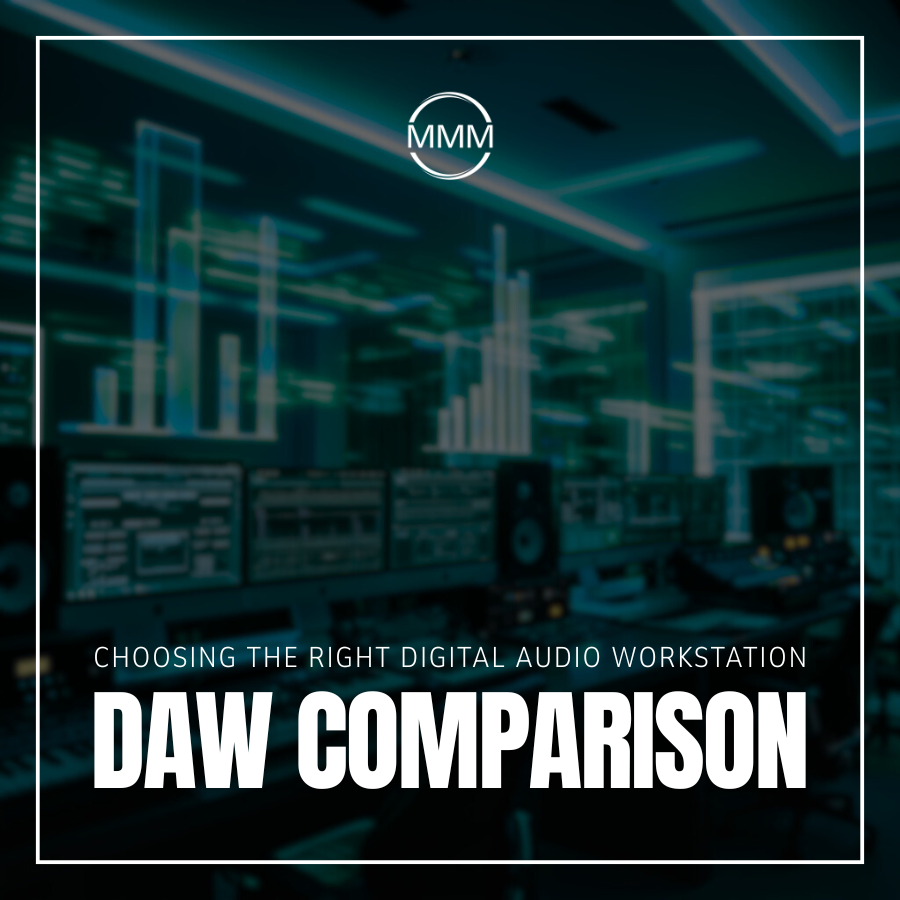DAW Comparison: Choosing the Right Digital Audio Workstation
DAW comparison is a must for every music producer, songwriter, or sound engineer in 2025. Choosing the right digital audio workstation software directly impacts how you record, edit, mix, and master your music. With so many music production software options available, finding the best fit for your workflow can feel overwhelming.
This digital audio workstation comparison guide breaks down the most popular DAWs—their features, pricing, and best use cases—so you can confidently choose the platform that elevates your music career.

What Is a Digital Audio Workstation (DAW)?
A Digital Audio Workstation (DAW) is software that allows you to record audio, sequence MIDI, mix tracks, and apply effects to create professional-quality music. DAWs are used across all genres, from bedroom beat-making to film scoring and commercial studio production.
2025 DAW Comparison: Which Music Production Software Fits You Best?
Ableton Live: Best for Electronic Music & Live Performance
- Strengths: Flexible workflow, unmatched for electronic music, EDM, and live sets.
- Key Features: Session view for improvisation, powerful stock instruments, Max for Live integration.
- Best For: Producers who perform live, DJs, and electronic music creators.
- Pricing: Intro ($99), Standard ($449), Suite ($749).
FL Studio: Best for Beginners & Beat Makers
- Strengths: User-friendly interface, lifetime free updates, popular with hip-hop and EDM producers.
- Key Features: Step sequencer, easy piano roll, strong plugin library.
- Best For: Beginners, beat producers, and loop-based music makers.
- Pricing: Fruity ($99), Producer ($199), Signature ($299), All Plugins Edition ($499).
Logic Pro: Best for Mac Users
- Strengths: Affordable for its power, tightly integrated with macOS, tons of instruments and samples.
- Key Features: Live Loops, Drummer tool, Dolby Atmos mixing.
- Best For: Songwriters, composers, and producers who use Apple ecosystems.
- Pricing: $199 (one-time, Mac only).
Pro Tools: Industry Standard for Recording & Mixing
- Strengths: Professional-grade recording and mixing, widely used in major studios.
- Key Features: High-quality audio editing, seamless hardware integration, advanced mixing tools.
- Best For: Recording studios, engineers, and film/TV post-production.
- Pricing: Subscription-based — Artist ($9.99/mo), Studio ($31.99/mo), Flex ($99/mo).
Cubase: Best for Composers & Advanced Arrangements
- Strengths: Strong MIDI capabilities, orchestral scoring tools, and versatility.
- Key Features: Chord track, advanced audio editing, film scoring integration.
- Best For: Composers, arrangers, and hybrid producers (MIDI + audio).
- Pricing: Elements ($99), Artist ($329), Pro ($579).
Studio One: Best for Workflow Speed
- Strengths: Drag-and-drop interface, smooth workflow, great for both beginners and pros.
- Key Features: Integrated mastering suite, score editor, strong third-party plugin support.
- Best For: Producers who want speed and flexibility.
- Pricing: Artist ($99), Professional ($399), Sphere subscription ($14.95/mo).
Reaper: Best for Budget-Friendly Power
- Strengths: Extremely customizable, lightweight, affordable.
- Key Features: Unlimited tracks, full routing control, vast plugin support.
- Best For: Budget-conscious producers, experimental creators, indie studios.
- Pricing: $60 discounted license, $225 commercial license.
How to Choose the Right DAW: A Practical DAW Comparison Guide
When comparing DAWs, consider these factors:
- Budget: Do you prefer a one-time payment (Logic Pro, Reaper) or subscription (Pro Tools, Studio One Sphere)?
- Genre: EDM and hip-hop producers often favor FL Studio or Ableton, while rock, pop, and film scoring lean toward Pro Tools or Cubase.
- Workflow Preference: Some DAWs are loop-based (FL Studio, Ableton), while others are linear (Pro Tools, Cubase).
- System Compatibility: Logic Pro is Mac-only; most others are cross-platform.
- Learning Curve: FL Studio and Studio One are beginner-friendly, while Cubase and Pro Tools have steeper learning curves.
DAW Comparison Takeaway: The Best DAW Depends on Your Workflow
There’s no single “best” DAW — it depends on your workflow, budget, and creative style. Many professionals even use more than one.
- If you’re into beats and loops → FL Studio or Ableton Live.
- If you want industry-standard mixing → Pro Tools.
- If you’re a composer or arranger → Cubase.
- If you’re on a budget but want power → Reaper.
- If you’re all-in on Mac → Logic Pro.
The most important thing is to pick a DAW you feel comfortable with and commit to mastering it. The DAW is just the tool — your creativity is what makes the music.


No Comments